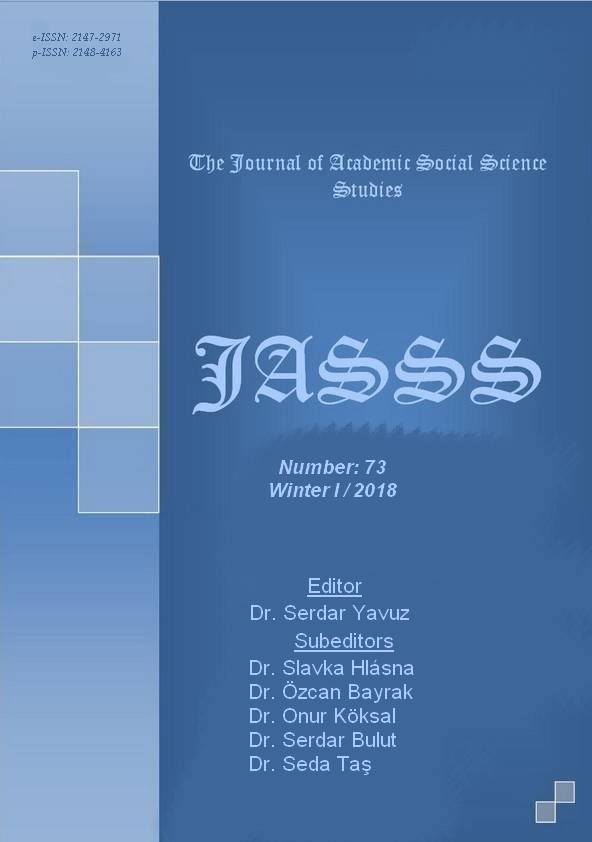Author :
Abstract
fütüvvetnâmeler, Ahilik kültürünün en önemli eserleridir. Fütüvvet anlayışının işlendiği bu eserlerde, yüzyıllar öncesine uzanan bir kültürel geleneğe bağlı aynı meslek ya da topluluktaki insanların ortak dili saklıdır. Esnaf loncalarını da kapsamına alan bu dil; fütüvvet ehlinin çeşitli sebeplerle çoğu zaman da ihtiyaca bağlı olarak genel dilin sözcüklerinin kendilerine has anlamlar kazandığı özel bir dildir. Bu yönüyle fütüvvetnâmeler, Türk dilinin kaynak kitabı olma özelliğine sahiptir. Anadolu coğrafyasında Batı Türkçesi ile yazılan çok sayıda fütüvvetnâme mevcuttur. Bunlardan en eskisi, Yahya bin Halil bin Çoban el-Burgazî tarafından kaleme alınan Burgazî Fütüvvetnâmesi’dir. Eski Türkiye Türkçesi döneminden kalan eser, Batı Türkçesine ait söz varlığının kayıtlı örneklerinden biridir. Özellikle deyimler yönünden oldukça zengindir. Eserde geçen bitisi kara olmak deyimi, “mahşer günü amel defterine göre günahkâr kullardan olmak” anlamında kullanılmıştır. Türk milletin söz yaratma gücünden doğan bu deyimin arka planında Türk tarihi ve kültürel mirasının izleri vardır. Bu izler, yüzyıllar öncesine dayanan fütüvvet anlayışının esas alındığı Ahilik kültürüne aittir. Bu çalışmada, Burgazî Fütüvvetnâmesi’nde geçtiği halde günümüzde unutulan bitisi kara olmak deyimi üzerinde durulacaktır. İki bölümden oluşan bildirinin ilk bölümünde, bitisi kara olmak deyimine temel teşkil ettiği için biti sözcüğünün yapısı, anlamı ve kullanımı tarihî lehçelerden başlanarak örneklerle gösterilmiştir. İkinci bölümde, biti sözcüğünün deyimleşmiş şekli olan bitisi kara olmak deyiminin anlamı ve kullanımı verilmiştir.
Keywords
Abstract
Futuvvetnâmes, which are accepted as a kind of regulations of the sufi communities and professional organizations are the most important works of Akhism (Ancient Turkish Professional Unions). In these works dominated by mentality of futuvvet, common language of the people who are in the same profession or in the same community which is related to cultural tradition dating back centuries, is reserved. This language, which is also including tradesman guilds, is a special language in which the words of the general language have their own meanings because of various reasons, but often because of necessities of futuvvet communities. In this respect, the futuvvetnâmes have the feature of being the source book of the Turkish language. There are a great number of futuvvetnâmes written in Western Turkish in Anatolia. The oldest of these is the Burgazî Futuvvetnâmesi, which was written by Yahya bin Halil bin Çoban al-Burgazî. Old Turkey Turkish period the remaining work is one example of the registered vocabulary of Western Turkish. It is especially rich in terms of idioms. To say that the end of describing the qualities necessary for the presence of a bird is to be used in the sense of “being a sinner according to the book of affairs.” The background of this saying arising from the power of word creation of the Turkish nation has traces of Turkish historical and cultural heritage. These traces belong to the cult of Ahilik, which is based on the understanding of futuch, which was based on centuries ago. In this paper, it will be emphasized on the idiom “bitisi kara olmak” which takes place in Burgazî Futuvvetnâmesi although it is forgotten in contemporary written language. In the first part of this paper, which is consisted of two chapters, , the structure, meaning and usage of the word biti is illustrated with examples begining from historical dialects, because of it constitutes the basis of the idiom “bitisi kara olmak”. In the second part, the meaning and usage of “bitisi kara olmak”, which is a form of biti converted to an idiom, is given.





